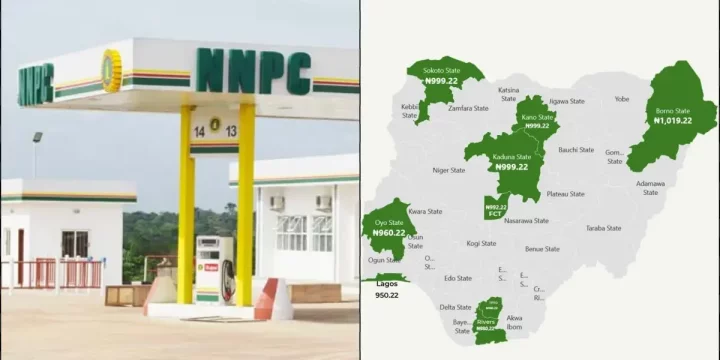Dangote's Influence On Nigeria's Petrol Market And NNPC Pricing

Table of Contents
Dangote Refinery's Projected Output and Market Share
The Dangote Petroleum Refinery, located in Lekki Free Zone, Lagos, is touted as Africa's largest single-train refinery. Its planned capacity is staggering, projected to refine 650,000 barrels of crude oil per day. This massive output holds the potential to significantly alter Nigeria's fuel landscape.
- Projected daily refining capacity: 650,000 barrels per day.
- Percentage of national demand it can potentially satisfy: A substantial portion, potentially exceeding 50%, significantly reducing reliance on imports.
- Estimated reduction in petrol imports: Millions of barrels annually, leading to substantial savings in foreign exchange.
- Potential impact on the Naira exchange rate: Reduced demand for foreign currency to import petrol could strengthen the Naira.
This level of domestic production could dramatically reduce Nigeria's dependence on imported refined petroleum products, a situation that currently drains significant foreign exchange reserves and leaves the country vulnerable to global price fluctuations.
Impact on NNPC's Pricing Power and Market Dominance
For decades, NNPC has held a near-monopoly over Nigeria's petrol market. However, the Dangote Refinery's emergence is poised to challenge this dominance. Increased domestic refining capacity will introduce competition, potentially leading to price deregulation and a more market-driven pricing mechanism.
- NNPC's current market share: Dominant, but this is set to change.
- Potential shift in market share following Dangote Refinery’s operation: A significant decrease for NNPC, with Dangote becoming a major player.
- Predicted price fluctuations post-Dangote refinery: Potentially lower prices due to increased competition.
- Impact on consumer purchasing power: Increased affordability of petrol for consumers.
This increased competition could usher in an era of more transparent and consumer-friendly pricing, significantly benefiting Nigerian citizens.
Economic Implications of Increased Domestic Refining
The establishment of the Dangote Refinery extends far beyond simply supplying petrol. Its economic ripple effects are profound, potentially transforming Nigeria's oil and gas sector and broader economy.
- Estimated job creation figures: Thousands of direct and indirect jobs across various sectors, including construction, operation, and logistics.
- Potential GDP growth percentage increase: A significant boost to GDP growth due to increased economic activity and reduced import costs.
- Attraction of foreign direct investment (FDI): Increased investor confidence and attraction of FDI in the oil and gas sector.
- Cost savings from reduced fuel subsidy: A reduction in government spending on fuel subsidies, freeing up resources for other development initiatives.
Challenges and Potential Risks
While the potential benefits are substantial, the path to success for the Dangote Refinery is not without challenges.
- Potential infrastructure bottlenecks: Ensuring adequate infrastructure to support the refinery’s operations, including transportation and storage.
- Regulatory uncertainty and bureaucratic hurdles: Navigating the complexities of Nigerian regulations and bureaucratic processes.
- Risk of operational disruptions: Potential technical issues or unforeseen circumstances affecting the refinery's production.
- Geopolitical factors impacting the oil market: Global events and geopolitical instability can affect crude oil prices and market demand.
Careful planning, efficient management, and proactive risk mitigation are crucial to overcome these hurdles and ensure the refinery's long-term success.
Conclusion
Dangote's influence on Nigeria's petrol market is poised to be transformative. The Dangote Refinery promises a significant increase in domestic refining capacity, leading to potential price reductions, enhanced economic growth, and decreased reliance on fuel subsidies. However, challenges related to infrastructure, regulations, and global market dynamics must be addressed. To fully understand the ramifications, staying informed about Dangote's impact is essential. Learn more about the Nigerian petrol market and follow the evolution of Dangote's influence to grasp the full picture of this significant development for Nigeria's economy. Staying updated on the progress and impact of the Dangote Refinery will be key to understanding the future of Nigeria's petrol market.

Featured Posts
-
 Les Miserables Cast Considers Boycott Over Trumps Kennedy Center Appearance
May 10, 2025
Les Miserables Cast Considers Boycott Over Trumps Kennedy Center Appearance
May 10, 2025 -
 Market Rally Sensex And Nifty Record Gains Ultra Tech Shares Fall
May 10, 2025
Market Rally Sensex And Nifty Record Gains Ultra Tech Shares Fall
May 10, 2025 -
 Jobs A Dijon Restaurants Et Rooftop Dauphine Postes A Pourvoir
May 10, 2025
Jobs A Dijon Restaurants Et Rooftop Dauphine Postes A Pourvoir
May 10, 2025 -
 Vegas Golden Knights Defeat Blue Jackets 4 0 Behind Hills 27 Saves
May 10, 2025
Vegas Golden Knights Defeat Blue Jackets 4 0 Behind Hills 27 Saves
May 10, 2025 -
 Understanding Trumps Transgender Military Ban Separating Fact From Fiction
May 10, 2025
Understanding Trumps Transgender Military Ban Separating Fact From Fiction
May 10, 2025
